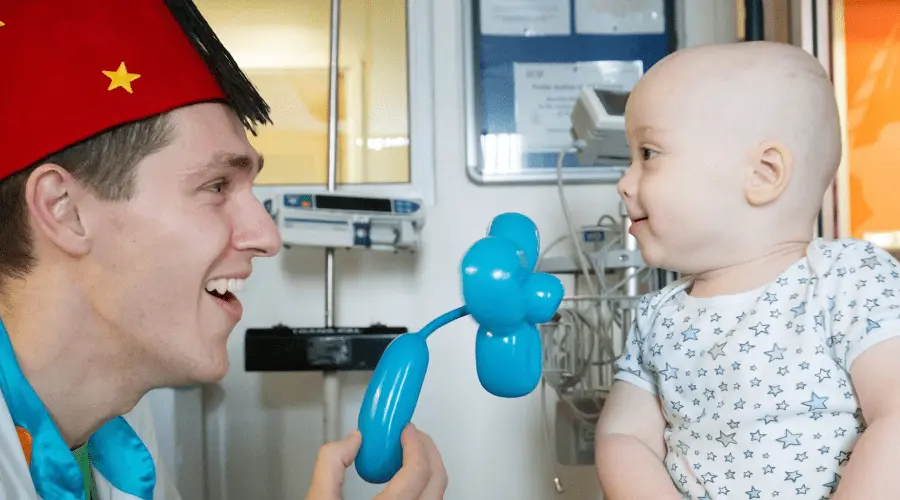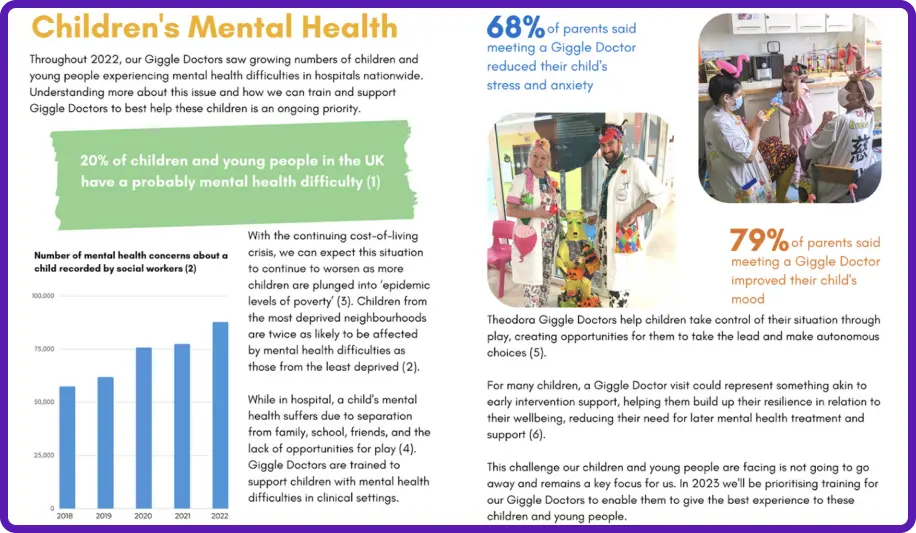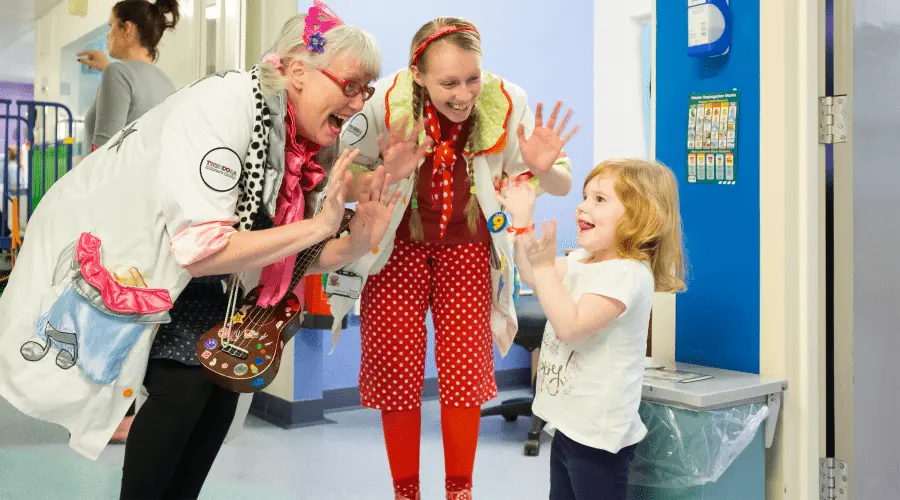settings
children
With Famly since
When someone first hears about the Giggle Doctors, they usually laugh. Sometimes it’s just a smile, but I’ve never met anyone who’s kept a completely straight face when introduced to the concept.
However, for some of the children in hospital who receive a Giggle Doctor visit, laughter may not be the best medicine. Sometimes a smile, a chat, or even telling the Giggle Doctor to leave can be the thing which makes the difference.
With the well-being and mental health of children and young people at a point of unprecedented crisis, doing everything they can to support these young people has become a key focus of the Giggle Doctors.
So how can you adapt some of the Giggle Doctors’ techniques in to your own practice? Let’s take a look.

Who are the Giggle Doctors?
Theodora Giggle Doctors have been visiting children in hospitals and specialist care centres for almost 30 years, bringing them the chance to play, laugh, and reconnect to just being a child.
Over the course of 15 minutes, often less, Giggle Doctors form a connection with an individual child and offer them the opportunity to engage in play. They’re led by the child’s interests, but they’ve always got a lot up their sleeves and in their many pockets to suit any age or preference. When a child is a bit shy at first, they might try a quick fart with the fart machine to see if that gets a grin, or blow some bubbles (always a winner!).
When new Giggle Doctors join Theodora Children’s Charity, they are already professional performers of one kind or another – actors, musicians, magicians…the list goes on, but they also go through a rigorous training process which covers everything from balloon modelling to NHS infection control protocols and plenty in between.
Sickness and injury can place any child in hospital, so Giggle Doctors also receive highly specialised training in techniques such as Intensive Interaction, which helps them build relationships with children with more complex learning and communication needs. Having all this training helps them use those precious 15 minutes to have the most meaningful encounter possible with the young people they visit.
How do the Giggle Doctors help?
Recently, Giggle Doctors have found themselves encountering more and more children and young people in hospitals who are experiencing mental health difficulties. Even before the pandemic, figures were on the rise, but the effects of Covid have vastly accelerated the number of young people ending up in hospital as a result of struggles with their mental health.
NHS staff are doing everything they can to care for these young people, but access to training and resources struggles to keep pace with the demand in many hospitals.
‘Play’ can sound like something which is silly and a bit frivolous, but it’s a serious business which is vital to children’s well-being and development, and having access to it in the hospital can also help children recover from physical illness and injury more quickly.

The big ideas
A Giggle Doctors case study
Sharon, a Senior Play Specialist at Chelsea and Westminster Hospital, wrote to us about the difference their regular visits from Dr Geehee have for the children on their wards.
“She brings laughter to all wards and engages with the medical team. She is a ray of sunshine in what can sometimes be a very frightening place for our sick children. The difference she makes to the mental well-being of all our patients who are lucky enough to spend time with her is invaluable.
The children are often traumatised and within a short time will find smiles for Dr Geehee. She is able to normalise medical areas and show the patients that doctors wearing a white coat are not always frightening.”
Dr Geehee has spent over 20 years honing her skills as a Giggle Doctor, but how can she tell what the right thing is for each child when she meets them?
Trauma-informed interactions
Being hospitalised due to struggles with mental health is a very serious situation, and Giggle Doctors have to be sensitive to any risks to the young person when they meet them, as trauma can manifest in lots of different ways.
No matter the child, Giggle Doctors always focus on meeting them where they are in that moment, recognising their energy levels, and offering them a chance to play which they can access. Talking about her role, a Giggle Doctor said to me recently, “It’s not about me,” and recognising this is crucial to success.
Giggle Doctors are often used to being performers at the centre of attention, but when they get into costume, whether it’s Dr Geehee, Dr Teapot, or Dr Fancy Pants, it’s all about the child in front of them. As Colin, a teacher who works in one of our specialist care centre partners describes it, Giggle Doctors “leave their ego at the door,” and that’s when the magic happens.

How can you utilise this in your practice?
- Reflect on how you ‘meet children where they are’ in your daily practice. How do parents share how their child is doing at drop-off, so you know how to receive them into your care? Is there an opportunity in your environment for children to be relaxed or quiet when their energy levels are low and active when their energy levels are high?
- Think about how you focus on the child at the centre of your practice and not yourself. Is your daily routine set up for the convenience of the adults or the comfort of the children? Is your environment aesthetically pleasing for parents or functional for the children?
The value of listening and attention
One of the wonderful things about Giggle Doctors is that they can offer these young people their complete attention, with no agenda other than spending time with them as a person.
Children and young people struggling with their mental health are used to adults identifying them through their condition and their mental and physical health, so when a Giggle Doctor comes to spend time with them for who they are - quite apart from the reason for their hospital stay – it can be a real breath of fresh air for the young person.
Every interaction with a Giggle Doctor offers the young person a gift: the gift of the Giggle Doctor’s time and attention, the gift of just a little smile, the gift of having the power to tell someone to go away when many of a young person’s other freedoms have been taken away.
How can you utilise this in your practice?
- While it may be harder with a room full of children to consider, think about how you can ensure each child feels they have your full attention, at least some of the time.
- If you send children who need special support away from their peers to complete activities, reflect on how that impacts that child. Do they feel valued in those interactions or might they feel like a problem to be fixed?
- Reflect on how you offer children autonomy in your practice. For example, you can promote bodily autonomy by asking for consent before you help a child wash their hands. Do children have choices of what to play with or what activities to take part in?
Understanding the impact you make
One of the tricky things about being a Giggle Doctor is that you often only see a child once, and it can be hard to see whether you’ve made a difference unless a parent or caregiver, or member of staff lets you know. Attunement with a child’s emotions and energy levels can be very challenging to achieve when the young person is experiencing difficulties with their mental health, and sometimes the Giggle Doctor can’t easily tell whether they’ve managed to form a connection.
To help us understand the difference we can make, and ensure Giggle Doctors are as well-equipped as possible, we’ve been working with another charity called Theatre Troupe – an outstanding arts charity that uses the power of drama to support young people who have experienced trauma. Theatre Troupe have helped us see how we can reframe what success looks like in an encounter between a Giggle Doctor and a young person experiencing mental health difficulties.
For example, if the only reaction a child gives is to nod or shake their head, a Giggle Doctor might feel they haven’t offered that child the joyful play they hoped to, but if the child usually doesn’t speak to anyone other than their parent, this could be quite a breakthrough!
Similarly, if a young person says “no” and asks a Giggle Doctor to leave, that’s a moment when that young person has regained a little control over their situation.

How can you utilise this in your practice?
- Think about how you value all children’s interactions - deciding not to take part in an activity can be just as powerful for a child as taking part, but often this is not recognised or praised the same way an ‘affirmative’ interaction is.
- Think about the methods you use to learn about children from thier parents and carers. Is information exchanged about how a child is feeling each day? How often do you ask parents and carers for feedback about how they feel their child is doing?
- Consider the different methods of communication children use - speech and language is important but interactions can take many forms. How can we support children with differing communication styles and needs?
Leaving a lasting impression
Working with Theatre Troupe has taught us so much about the power of gift giving, and they encouraged the Giggle Doctors to think about gifts they can leave behind – a sketch of a cat on the back of a postcard, an origami frog, a sticker. Something which keeps the memory of those precious shared moments alive in the young person’s mind long after the Giggle Doctor has left.
Of course, like everyone who works with these vulnerable young people, Giggle Doctors need to be mindful that they don’t leave behind something which might put a child in harm’s way. Giggle Doctors always receive a detailed handover from staff before they meet a young person with mental health difficulties, so they know what they need to do to help keep that young person safe.
Some of these young people are so vulnerable that it can feel daunting for a Giggle Doctor when they go to visit them, but at their heart these are still young people who need love and fun and play just like everyone.
When there’s no external sign, it’s easy to feel that you’re not making a difference, but just by being there, by showing a young person you see them and hear them you are giving them something wonderful. Accepting that gift with a smile or a laugh may be too painful for them in that moment, but even just in offering it, you are making a difference.
How can you utilise this in your practice?
Reflect on how meaningful it is when a child draws a picture for you or brings you an interesting rock they found from the garden. We can do the same thing for children too. Offer a sticker or a little drawing to the children you look after, and not as a prize or a reward - just to let them know you care.
Get 1000s of free EY activities
Want over 7,000 activities? See them in a free 14-day trial. Filter to target learning areas, age groups and topics, and get inspired.
Get started









